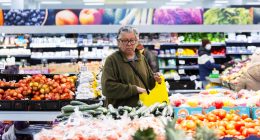
Just over a year ago, Soren Bjorn, who helps run the world’s biggest berry company, made a bad call.
Demand for fresh berries was falling as the onset of a pandemic shut restaurants, while grocers focused on keeping staples in stock. Mr. Bjorn, president of the Americas division of Driscoll’s Inc., told farmers in California to plant fewer strawberries.
Then, Americans stuck at home went on a berry binge. Strawberry demand surged.
This March, Mr. Bjorn made the opposite decision, telling farms to increase their strawberry acres when they plant the crop this fall. Those acres won’t yield berries until next spring. “The world will change three times over between now and then,” Mr. Bjorn said.
Colossal challenges for food suppliers arrived with the pandemic last year, affecting every stop along food’s course from farm to table. Now, as the pandemic moves into its latest phase—under attack by vaccination, yet still unpredictable—it is proving even trickier for food businesses to navigate consumers’ ever-evolving appetites and a balky supply chain.








